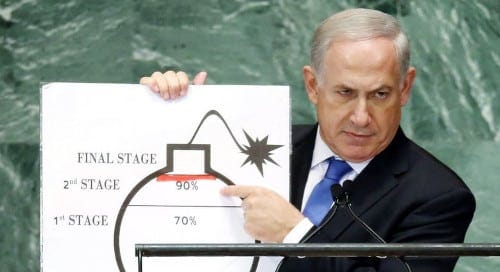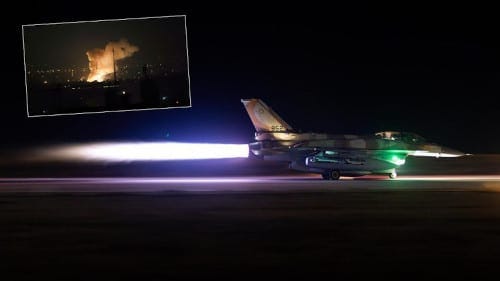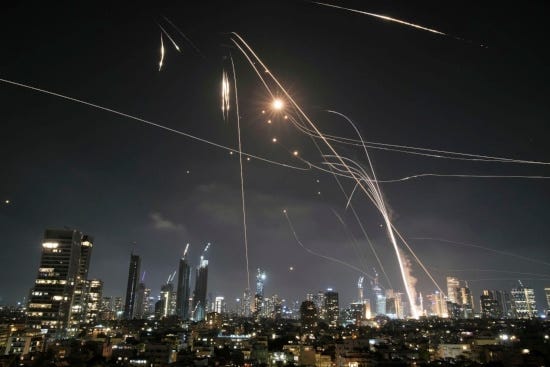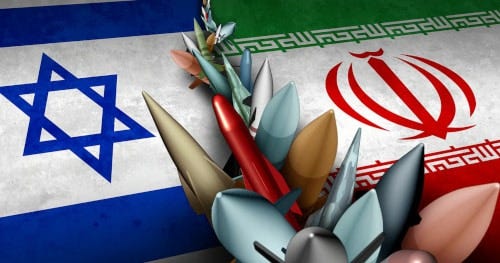On the night of June 12, 2025, Israel launched a wave of attacks against Iran.
Dubbed "Operation Rising Lion," Netanyahu called it a "targeted military operation to roll back the Iranian threat to Israel's very survival" and vowed to continue the operation "for as many days as it takes to remove this threat."
In the immediate aftermath of the attacks, it was reported that:
key Iranian generals and scientists had been killed in the initial attack;
several strategic Iranian sites, including Natanz, Iran's main nuclear enrichment facility, had been struck;
and Iran had launched more than 100 drones and begun missile strikes against Israel in retaliation.
So, why is this happening? What is the situation now? And where do we go from here?
Let's explore those questions. But please note that this is a developing, breaking news situation and information that was accurate at press time will be out of date soon. As a result, in the spirit of The Corbett Report's ongoing open source investigations, I am exhorting Corbett Report members to log in to corbettreport.com and leave links to up-to-date information in the comments section there.
Thank you for your participation!
The Background
Israel's bellicose warmongering over Iran's nuclear program is of course nothing new. In fact, if you've followed my reporting on the subject over the years, you'll know all about unconvicted war criminal Benjamin Netanyahu's string of increasingly outlandish publicity stunts and intelligence-insulting cartoon drawings warning of the "imminent threat" of Iran's nuclear program.
Who can forget Bibi's 2012 address to the UN General Assembly, for example, where he brandished his Wile E. Coyote red line bomb cartoon and darkly predicted that Iran was going to move on to the final stage of its nuclear weapons program within a year?
And who can forget when, in 2018, Netanyahu pulled back the curtain (literally) on "half a ton" of intelligence material supposedly pilfered out of the Iranian nuclear archives, including 55,000 pages of documents in an assortment of ominous-looking two-ring binders and 183 CDs containing another 55,000 files? (Presumably there wasn't enough stage space for 90,000 floppy disks.)
But for those who believe that Netanyahu has been prophesying the detonation of the ticking time bomb of Iran's nuclear program for only the past 15 years, it's been even longer than that!
According to then-Iranian Foreign Minister Mohammad Javad Zarif, Bibi's "been making allegations about Iran since 1992. In 1992, according to Zarif, we were supposed to have finished making a bomb in about five years. In 1996 still five years. So he’s been on the record — even testifying before Congress — that Iran is just about to make a nuclear weapon.”
But don't take Zarif's word for it. Here's YNet News: Netanyahu in 1993: Iran will have bomb by 1999.
Of course, as readers of this column will also know, the perception of the "Iranian nuclear threat" has been propped up for decades by rumour, misinformation, propaganda and crude deceptions. In reality:
the UN's nuclear watchdog has repeatedly confirmed that Iran never diverted any nuclear material into any military program;
the US intelligence community itself conceded in 2011 that Iran was not trying to build a nuclear bomb;
and even the Mossad made an assessment in 2012 that Iran was “not performing the activity necessary to produce weapons.
After Trump unilaterally pulled the US out of the "Joint Comprehensive Plan of Action" (a.k.a. the Iran nuclear deal) in 2018, Iran was put in a position where they were forced to start "stockpiling" heavy water and uranium, not because they were actively pursuing a nuclear weapons program but because they were legally forbidden from doing anything else with it.
In fact, the litany of points about the sham of the post-JCPOA Iranian nuclear "threat" could fill an entire editorial (and it has!). But perhaps this laser-like focus on Iran's (so far) peaceful civilian nuclear program misses the point entirely: namely, that the only actual nuclear power in the Middle East is Israel, who stole the technology for their own nuclear weapons program from the US (with Netanyahu's help) and whose stockpile of nuclear weapons has never been subjected to inspection or even officially acknowledged.
In recent months, however, the Iranian nuclear calculus has begun to change dramatically. After decades of insisting that Iran would never develop a nuclear weapon, Netanyahu's repeated references to the "Libyan model" for Iran—that is, persuading the country to give up its nuclear program in return for (false) reassurances of aid and protection—have only further affirmed that nuclear deterrence is the only long-term guarantee that Iran will not be "love bombed" by Israel and NATO.
These concerns have greatly complicated recent negotiations between Tehran and Washington over the possibility of resurrecting the Iran nuclear deal. The tensions over these negotiations came to a head in the past week, when the UN's nuclear watchdog, the International Atomic Energy Agency (IAEA), voted to censure Iran over its noncompliance with inspectors, raising the specter of the reimposition of all UN sanctions on the country.
Iran responded to this IAEA censure by announcing it had built and would activate a third nuclear enrichment site. "I don’t know how to cooperate with the outside world to stop them from doing evil acts and let the people live independently in this country," Iran President Masoud Pezeshkian said. "We will continue down our own path; we will have enrichment."
The Strikes
Whether or not Iran's announcement of its third nuclear enrichment facility played any part in the timing of Operation Rising Lion is yet to be determined. What is known, though, is that the strike is "the result of years of covert planning, surveillance and infiltration by Israeli intelligence."
Specifically, according to a "senior Israeli security official" talking to Fox News:
We established a drone base inside Iran, and at zero hour, Mossad operatives retrieved them from hiding spots. We placed precision missiles on numerous vehicles and embedded additional missiles throughout the country, hidden inside rocks. We activated this entire array in precise coordination with the Israeli air force.
The first round of strikes, consisting of "more than 200 fighter jets across roughly 100 targets," seems to have accomplished several Israeli objectives.
Initial reports indicated that strikes on residential areas of Tehran killed 78 and wounded 329 others.
Iran's Tasnim news agency, meanwhile, confirmed soon after the commencement of the campaign that Hossein Salami, the commander of Iran's Revolutionary Guards, had been killed in the attacks. Iranian state television further confirmed the deaths of Fereydoun Abbasi, the former head of the Atomic Energy Organization, Mohammad Mehdi Taranchi, a nuclear scientist and the president of Islamic Azad University, and a handful of other prominent Iranian nuclear researchers and scientists.
As for the nuclear sites targeted in the attack, the Institute for Science and International Security [ISIS] reports that "[o]ther than the Natanz enrichment site, key nuclear facilities do not appear to have been targeted on Day One. In fact, nuclear sites in general were not targeted." As for Natanz, ISIS reports on satellite imagery as well as ground imagery it obtained of the site, showing "extensive damage to the electrical power supply for the complex, including the main outdoor transformer substation, a concealed transformer substation, and two backup gas turbine generators, with smoke still rising when the image was taken around 11 AM local time."
The Retaliation
In response to "Operation Rising Lion," Iran has launched the somewhat more prosaically named "Operation Severe Punishment."
This being 2025, the official announcement of the campaign by Iran's Supreme Leader Ayatollah Ali Khamenei came not from a televised public address but from a post on Elon Musk's X: "That [Zionist] regime should anticipate a severe punishment .By [sic] God’s grace, the powerful arm of the Islamic Republic’s Armed Forces won’t let them go unpunished."
So far, that "severe punishment" has consisted of a swarm of 100 drones (which are being shot down not only by the Israeli Air Force but by the Jordanian military) and a volley of over 150 ballistic missiles (which the US is helping Israel to intercept).
According to The Economic Times, Iranian media is reporting that the main target of the strikes was the city of Tel Aviv, and Iran is claiming to have successfully hit the Israeli Ministry of Defense. Also per ET: "Iranian missiles attacked a key IDF command post in Kirya, where most of the Israeli military and political leadership was located."
There are so far no confirmed reports of damage in Israel and there is no confirmation of claims that 50 of Iran's missiles have been intercepted by Israel's "Iron Dome" air defense system.
How This Ends
The immediate response to these events is hardly surprising: Iran has cancelled its participation in this weekend's scheduled sixth round of nuclear negotiations with the US.
But the real question, of course, is where the situation goes from here. There is no doubt that we are witnessing a significant escalation in the buildup to all-out regional war, but whether these events continue to escalate or whether this current exchange ends quickly depends largely on the response of powers from outside the region.
A number of foreign governments, including Japan, Iraq, Oman, Saudi Arabia, and, perhaps most significantly, China and Russia, have condemned Israel's "pre-emptive" attack as an act of aggression and a severe breach of international law.
Russia's response is particularly important to the prospect of future peace, as Russia, a strategic ally of Iran, has been warning the US against an invasion of Iran since at least 2007. So far, Russia has made it clear that they are prepared to stand by Iran but has stopped short of committing military resources to the cause at this point.
"Israel's actions cannot be justified from a legal, political, military or moral point of view," said Konstantin Kosachev, vice-speaker of Russia's upper house of parliament and head of the Foreign Affairs Committee. “The only hope, albeit illusory, of avoiding a full-scale war is a consolidated condemnation of this operation by the international community."
But that hope seems to rest on the assumption that the US, still the world's military superpower, will join in that chorus of condemnation.
So far, Uncle Sam has been looking to distance itself from Israel's strike, with US Secretary of State Marco Rubio calling the strike a "unilateral action" on Israel's part and insisting "we are not involved."
But that quick disavowal is being undermined by the latest reporting, which indicates that Washington knew of the strikes beforehand and that Israel "had a clear US green light" to proceed.
According to Axios: "Two Israeli officials claimed to Axios that Trump and his aides were only pretending to oppose an Israeli attack in public — and didn't express opposition in private."
Accordingly, the Iranian Foreign Ministry has issued a statement blaming the US for the attack:
The Zionist regime’s aggressive actions against Iran cannot have been carried out without the coordination and authorization of the United States. Accordingly, the United States government, as the main supporter of this regime, will also be responsible for the dangerous effects and consequences of the Zionist regime’s adventure.
Whether or not Iran by itself will be able to cripple or even significantly hurt the combined military forces of Israel and US is currently doubtful. The prospect of Iran blockading the Straits of Hormuz and thus choking off one-fifth of global oil shipments—long held up as one of Iran's most effective ways of flexing its muscle on the world stage—has been greatly exaggerated, according to a number of analysts.
John Kemp of JKempEnergy.com, for instance, dismisses the threat of a Hormuz blockade altogether:
In theory, Iran could halt tanker traffic in the Strait for a short period by attacking or threatening vessels transiting the narrow waters at the entrance to the Gulf. But the most likely response is that the United States and its allies would organise an armed convoying system with U.S. and allied warships escorting tankers. Once convoys were in place, an attack would bring Iran into direct conflict with the United States – a conflict Iran’s leaders have revealed they are anxious to avoid by their prior behaviour.
The calculus of whether Iran would be emboldened to directly take on the United States, however, could change significantly if Russia (and even China) were to commit forces to the region. If and when Iran believes that Russia, China, and other nations concerned about these acts of aggression and breaches of international law are willing to fight for those principles, there is the real prospect of a larger, multi-front war eventuating from this. Sadly, it doesn't take a great deal of imagination to foresee a scenario in which China moves against Taiwan and Russia makes a decisive plunge into Ukraine while engaging US and Israeli forces in the Middle East.
Yes, as Corbett Reporteers have known since 2007, WWIII Starts in Iran. Let's just hope that cooler heads will prevail so that world conflagration does not start in 2025.
As mentioned at the start of today's exploration, this is a developing news story and much of the info on the strikes and the retaliation to those strikes will be outdated shortly. Once again, Corbett Report members are invited to log in and leave up-to-date information about developments in this story in the comments section there.
Like this type of essay? Then you’ll love The Corbett Report Subscriber newsletter, which contains my weekly editorial as well as recommended reading, viewing and listening. If you’re a Corbett Report member, you can sign in to corbettreport.com and read the newsletter today.
Not a member yet? Sign up today to access the newsletter and support this work.
Are you already a member and don’t know how to sign in to the website? Contact me HERE and I’ll be happy to help you get logged in!







